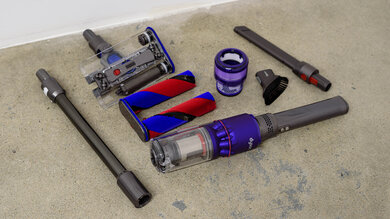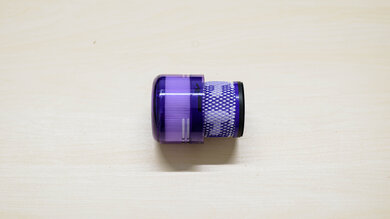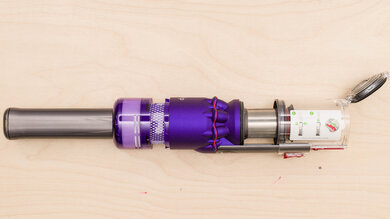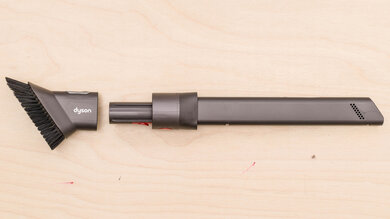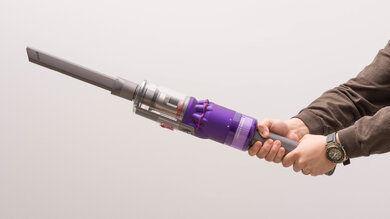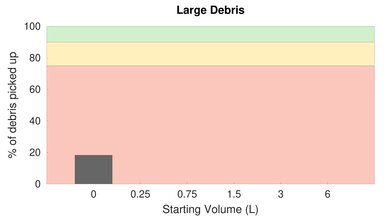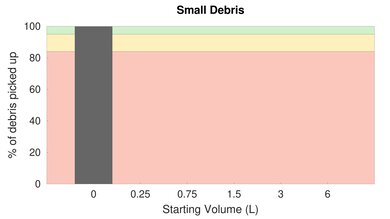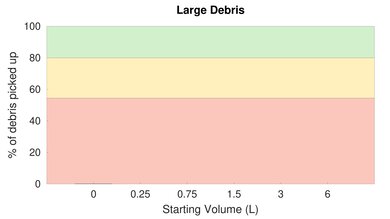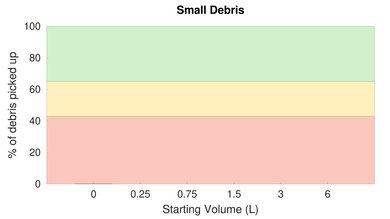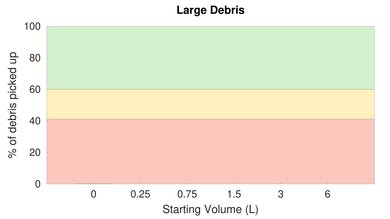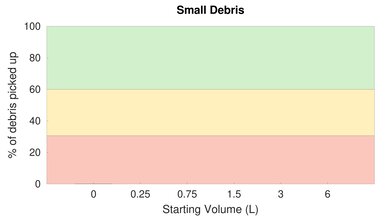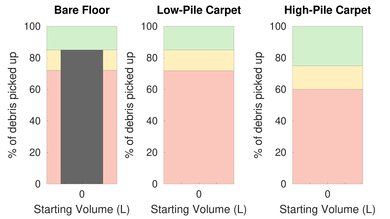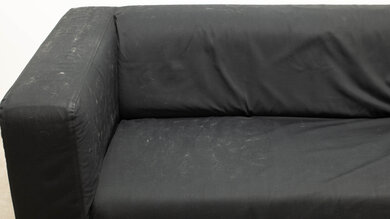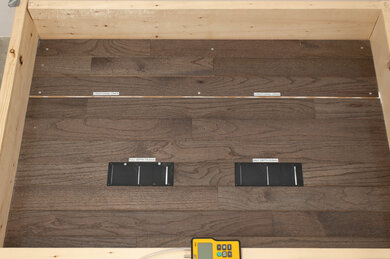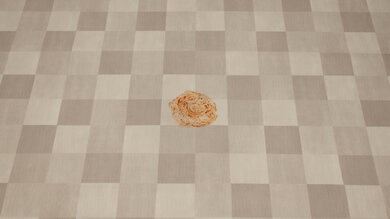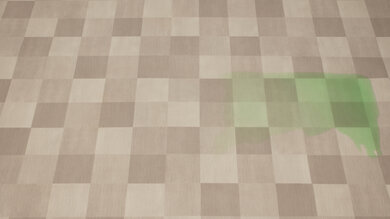The Dyson Omni-glide is a very lightweight stick/handheld vacuum. It occupies a unique spot within Dyspn's product lineup, being more compact and maneuverable than mainstays like the Dyson V8, with an extremely lightweight design and a multidirectional head equipped with two soft brushrolls and four caster wheels. However, it's only intended for use on bare floors, not carpets, and compromises on debris pickup performance and battery life when compared to its more conventional stablemates.
Our Verdict
The Dyson Omni-glide is okay for cleaning bare floors. Its twin soft-roller floorhead makes it a cinch to maneuver on hard surfaces. That said, while it has no trouble dealing with pet hair and lightweight debris, it has a much harder time dealing with larger material, which can get stuck on the brushrolls or in the narrow vacuum suction inlet. Its dirt compartment is also very small and needs frequent emptying.
-
Easily clears small debris like rice.
-
Unique head can rotate in any direction.
-
Struggles with bulky material.
-
Tiny dustbin.
The Dyson Omni-glide isn't intended for cleaning carpets since its soft rollers provide minimal agitation on this surface type. We didn't test its performance on this surface type.
The Dyson Omni-glide isn't intended for cleaning carpets since its soft rollers provide minimal agitation on this surface type. We didn't test its performance on this surface type.
The Dyson Omni-glide is a mediocre choice for cleaning up after pets. It's only intended for cleaning bare floors, and while it does clear most pet hair from that surface type, it may take several passes or some special maneuvering to achieve. Its selection of included attachments isn't all that useful for handling pet hair on upholstered surfaces. On the plus side, it has an allergen-trapping HEPA filter, and the brushrolls are removable, making removing any tangled hair easier.
-
Allergen-trapping HEPA filter.
-
Tiny dustbin.
-
Only intended for use on bare floors.
The Dyson Omni-glide is a great choice for cleaning stairs. While it's only intended for use on bare floors, and its performance on that surface type is mediocre, it's very lightweight, easy to maneuver, and simple to switch into a handheld configuration. It's cordless, so you don't need to worry about swapping outlets while cleaning a long staircase. Unfortunately, the battery can deplete in as little as nine minutes, so you may need to work quickly, depending on your power setting and tools.
-
No recurring costs.
-
Handheld configuration.
-
Tiny dustbin.
The Dyson Omni-glide is a decent choice for cleaning your car's interior. The main head isn't for use on carpets, but you can switch it into a handheld configuration and use it with its extension wand or combination tool. It's very lightweight and maneuverable, and since it's cordless, you don't need to worry about finding a nearby outlet. Unfortunately, it doesn't come with a turbo brush or an upholstery tool that cleans fabric-covered car seats.
-
No recurring costs.
-
Handheld configuration.
-
Tiny dustbin.
-
Comes with limited tools.
The Dyson Omni-glide is a poor choice for cleaning workshops, though this is far from its intended use. It lacks the power to suck up heavy debris and can't deal with liquid spills.
- 7.2 Bare Floor
- 5.3 Low-Pile Carpet
- 4.1 High-Pile Carpet
- 6.2 Pets
- 7.8 Stairs
- 6.7 Cars
- 3.8 Workshop
- Updated Aug 16, 2023: We've updated the text in the review to account for the new tests and scoring methodology in Vacuum Test Bench 1.0 and Vacuum Test Bench 1.1.
- Updated Aug 25, 2022: This vacuum's suction force has been retested with a more accurate manometer. The test results for the 'Maximum Suction' and 'Normal Suction' fields have been updated. All relevant scores and text have been updated.
- Updated Aug 03, 2022: Updated 'Stains' field to include a link to BISSELL CrossWave Cordless Max 2554 vacuum review, an alternative that has a mopping function to deal with dried-on messes.
- Updated Jul 28, 2022: Converted to Test Bench 1.1.
- Updated Apr 01, 2022: Converted to Test Bench 1.0.
- Updated Apr 23, 2021: Review published.
- Updated Apr 21, 2021: Early access published.
- Updated Apr 14, 2021: Our testers have started testing this product.
- Updated Apr 09, 2021: The product has arrived in our lab, and our testers will start evaluating it soon.
- Updated Apr 01, 2021: We've purchased the product and are waiting for it to arrive in our lab.
Differences Between Sizes And Variants
The Dyson Omni-glide is available in one color variant, 'Purple', which we tested. You can see the label for the unit we tested here. If you come across another variant or yours is different, please let us know in the discussions so we can update our review.
Compared To Other Vacuums
The Dyson Omni-glide is a very lightweight stick/handheld vacuum. It's meant for cleaning bare floors, but, unfortunately, has worse performance on this surface type than most other Dyson models that we've tested. There are several similarly slim and lightweight vacuums with better performances, like the Dyson V8 or the Shark WANDVAC System.
If you want other options, check out our lists of the best cordless vacuums, the best cordless stick vacuums, and the best lightweight vacuums.
The Dyson V8 is a better vacuum than the Dyson Omni-glide. The V8 delivers significantly better performance on bare surfaces, and its dirt compartment is much bigger. On the other hand, the Omni-glide is much more maneuverable and is easier to maintain. However, while it easily clears smaller debris like rice from bare surfaces, its overall performance on that surface type is mediocre. It's also not intended for cleaning carpets.
The Dyson V11 is a better vacuum than the Dyson Omni-glide. The V11 delivers excellent performance on bare floors and does a very good job on carpets. It comes with a bigger variety of tools and brushes, and its dirt compartment can hold more debris. On the other hand, the Omni-glide is much lighter and recharges more quickly, although its performance on bare floors is mediocre.
The Dyson V15 Detect is far more versatile than the Dyson Omni-glide. The V15 has a larger dustbin, a longer battery life, more tools and accessories, and better performance on bare floors. Unlike the Omni-glide, you can also use the V15 to clean carpets; it delivers superb performance. Meanwhile, the Omni-glide is much easier to maneuver, has fewer parts that require maintenance, and charges faster.
While they each have a similarly lightweight design, the Dyson Micro 1.5kg is better overall than the Dyson Omni-glide. Neither is suitable for use on carpets, but the Micro performs significantly better on bare floors, particularly when picking up bulkier debris like cereal. It also comes with more tools and accessories.
The Dyson V7 and Dyson Omni-glide suit different uses. The V7 delivers better performance on bare floors and is great on carpets. It also comes with a much wider variety of tools, including a hard bristle brush and a turbo brush. On the other hand, the Omni-glide is much more maneuverable and has a significantly better battery performance since its battery is removable and comes with a charging dock. However, it's not intended for cleaning carpets, and its performance on bare floors is only passable.
The Dyson V12 Detect Slim is a far more versatile vacuum than the Dyson Omni-glide. The V12 is easier to clean, has a larger dirt compartment, and can clean carpeted surfaces, unlike the Omni-glide, thanks to its more powerful suction motor and included multi-surface floorhead. It also has a surface detection system that lets it automatically adjust its suction power on carpeted surfaces or whenever it identifies an area with a high concentration of debris. However, the Omni-glide is smaller and lighter.
The Dyson Cyclone V10 is more versatile than the Dyson Omni-glide. The V10 has a larger dustbin, a longer maximum battery life, more tools and accessories, and performs better on bare floors. It can also be used to clean carpeted floors, unlike the Omni-Glide. However, the Omni-Glide is lighter, more maneuverable, and incurs fewer maintenance requirements.
The Dyson Cinetic Big Ball Animal and the Dyson Omni-glide have different strengths, and which you may prefer depends on your needs. The Big Ball delivers decent performance on low- and high-pile carpets. It's much easier to maintain, and its dirt compartment can hold more debris. However, the Omni-glide delivers somewhat better performance on bare floors since it struggles a bit less to clear bulky debris like cereal. It's also much lighter and more portable.
The Xiaomi Mi Vacuum Cleaner Light is more versatile than the Dyson Omni-glide. While these are both unusually-lightweight cordless stick vacuums, the Xiaomi has a bigger dustbin and a longer battery life. Most importantly, you can also use the Xiaomi on carpets, unlike the Dyson. However, the Dyson's omni-directional floorhead makes it even more maneuverable on bare floors than the Xiaomi.
The Shark WANDVAC System is a better vacuum than the Dyson Omni-glide. The Shark delivers significantly better performance on bare floors and does a very good job of cleaning carpets. It also comes with an upholstery tool for cleaning fabric-covered furniture. The Dyson isn't intended for cleaning carpets and delivers a mediocre performance on bare floors, but it has a uniquely designed rotating head that helps make it much more maneuverable.
The Shark Vertex Lightweight Cordless is a better vacuum than the Dyson Omni-glide. The Shark delivers significantly better performance on bare floors, and its dirt compartment is much bigger. It does a decent job on carpets, too. On the other hand, the Omni-glide is less than half the weight of the Lightweight Cordless. However, while it easily clears small debris like rice from bare floors, it struggles to suck up bulkier material and isn't intended for use on carpets.
The BISSELL CrossWave Cordless Max and Dyson Omni-glide are differently-designed vacuums with differing intended use cases, though they're both meant for cleaning bare floors. The Dyson is a uniquely-designed stick vacuum with a rotating twin-brushroll head. It's much lighter than the BISSELL, easier to maneuver, and makes less noise. You can also configure it as a handheld vacuum to better-clean hard-to-reach areas. Conversely, the BISSELL is a cordless upright vacuum/mop with a detergent-dispersal function to help scrub away dried-on stains. It's more effective than the Dyson in sucking up debris on bare floors and has a longer battery life, not to mention a much bigger dustbin.
Test Results
The Dyson Omni-glide cordless vacuum has an okay build quality. It's entirely made of plastic but is easy to assemble, with many components that can detach with the push of a button. The on/off and power setting controls are easy to reach as well. The dirt compartment is made of see-through plastic, so you can see how full it is, but unfortunately, it feels fragile and like it may break if dropped.
This vacuum is decently easy to maintain. A few parts need regular maintenance, but the vacuum has a simple design, and the process is straightforward.
- Dirt compartment: To empty the dirt compartment, you need to remove the wand first. Press the red button on the underside of the dirt compartment to open it and dump any accumulated debris over a garbage can. You can also completely remove it and wipe it with a damp cloth, but note that its small size makes it hard to fit your entire hand.
- Brushrolls: The brushrolls can be easily removed by pushing the button on top of the vacuum head and sliding them out from their axles. You can wash them as needed with cold water. You may also need to periodically detangle any hair that gets in the brushrolls, though their lack of bristles means that there isn't too much hair that gets caught on them.
- Filter: The filter is located near the exhaust of the vacuum and can be quickly removed by twisting counter-clockwise and sliding it off the handle. Clean it once a month with cold water or more frequently if you often use the vacuum set to its more powerful suction mode.
If you wash any part with water, it should dry for 24 hours before going back into the vacuum
.This vacuum incurs virtually no recurring costs. The filter won't need replacement if it's cleaned to manufacturer specifications. If a part gets lost or damaged, Dyson sells replacements through its website; you can see their storefront for the Omni-glide here.
This vacuum isn't all that large but doesn't come with many accessories to facilitate storage when not in use. It has a charging station that you can attach to the wall with the included screws. However, there isn't anywhere to stow the cord. There's also no onboard storage for the crevice tool or slide-on dusting brush.
This cordless vacuum has unlimited range as long as it has room left in the dirt compartment and battery life remaining.
This vacuum is remarkably portable. It feels very light in your hand and weighs noticeably less than even newer, slightly more conventional models like the Dyson V12 Detect Slim, making it a cinch to pick up and carry around.
This vacuum has an okay battery performance. If the vacuum is used in its stick configuration and set to the more powerful 'MAX' mode, the battery only lasts roughly nine minutes of continuous use. However, using the lower power setting provides just under half an hour of cleaning time if configured as a handheld vacuum with no tools attached. The vacuum takes a little less than two and a half hours to recharge completely, which is about an hour faster than the advertised charging time. Battery performance can vary with real-life use, though.
This vacuum has few extra features; you can only adjust its suction power level. There are two settings, 'Eco', which is the default, and 'Max', which is more powerful and intended for more stubborn messes.
Performance on bare floors is disappointing. It easily picks up smaller debris like rice but struggles with clearing away bulky debris like cereal because it tends to get jammed near the brushrolls, in the wand, or at the narrow entry to the dirt compartment, as seen here.
This vacuum isn't for use on carpets, according to the manufacturer. We didn't test its performance on low-pile carpets.
According to the manufacturer, this vacuum isn't intended for use on carpets. We didn't test its performance on high-pile carpets.
This vacuum does a good job of cleaning pet hair, as long as it's only on bare floors and maneuvered precisely. Instead of making ordinary back-and-forth passes, this Dyson performs best if you twist the handle as you pull it back so that the head pivots and goes forward over the debris again instead of being dragged backward.
This vacuum has poor suction performance at its floorhead, so it may have trouble dealing with heavier, denser debris. It produces even less power than old Dyson models like the Dyson V7.
This vacuum is pretty quiet. It makes a little less noise than the newer, more powerful Dyson V12 Detect Slim, but it still can mask the sound of a nearby conversation. However, using it in an enclosed room does help block out most of the noise.
Maneuverability is excellent. The Dyson's twin-roller head is really easy to lift and rotate, which helps with cleaning around obstacles like table legs and electric cords. The suction power and on/off buttons are conveniently placed and easy to press. It's fast and easy to switch it into a handheld configuration, making cleaning things like furniture or a coffee table simple. However, it's not meant for use on carpets.
This vacuum does a poor job of handling pet hair on furniture. In the absence of a turbo brush or even a straight-suction upholstery nozzle, you're forced to use its crevice tool for this kind of use, which has too small an aperture to be practical for cleaning large fabric surfaces.
This vacuum does a great job of sealing in fine debris. Like most other more conventional Dyson stick vacuums, it has a HEPA filter that's effective at capturing fine allergens.
This vacuum does a decent job of cleaning cracks and crevices. While it isn't all that powerful, its soft rollers can help dig into shallower cracks and draw out debris. Use the more powerful 'MAX' mode when cleaning deeper cracks, as it helps improve performance slightly. You can see a video of the vacuum running this test in its 'MAX' setting here, and the results of using that setting here.
This vacuum has no stain-clearing capability. If you're looking for a vacuum intended for bare floors that can easily handle stains, consider the BISSELL CrossWave Cordless Max.



